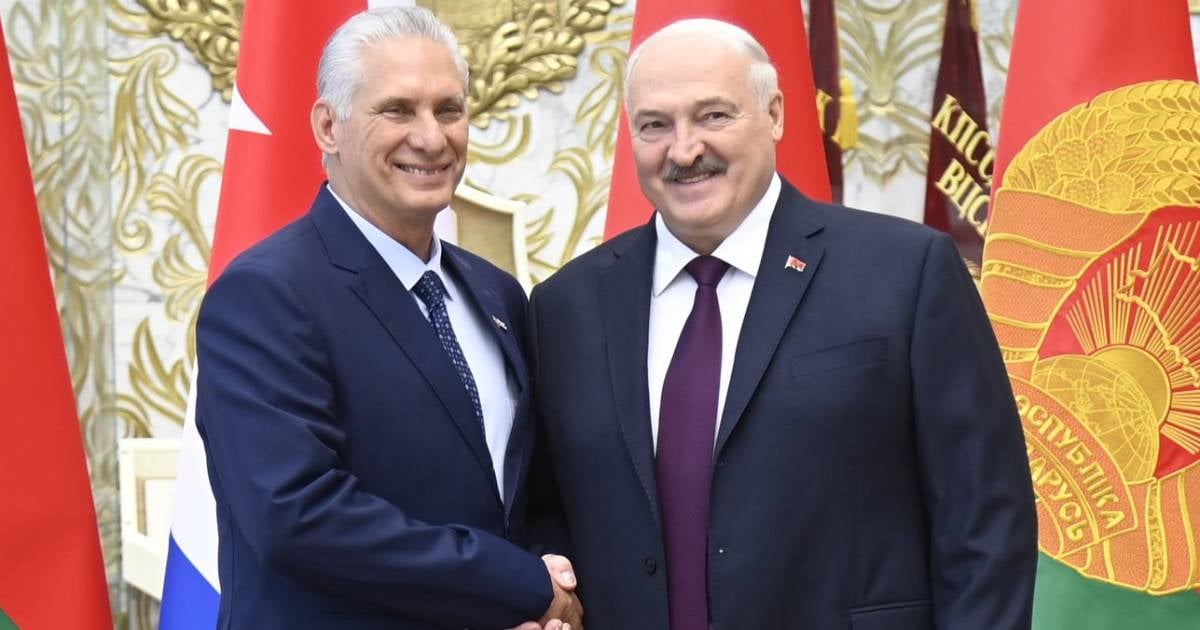During his recent visit to Minsk, Cuban leader Miguel Díaz-Canel presented a series of extravagant and symbolic gifts to his Belarusian counterpart, Aleksandr Lukashenko. This exchange, broadcasted on Belarusian state television Belarus 1, has sparked reactions due to the stark contrast with the hardships faced by the Cuban populace. The meeting took place on June 25, prior to the Eurasian Economic Forum, where both leaders discussed cooperation in strategic sectors. However, it was the gift-giving ceremony that drew significant attention on social media and in the press, as highlighted by the Belarusian state news agency BelTa.
Traveling with his wife Lis Cuesta and a delegation, Díaz-Canel gifted Lukashenko a box of Cuban cigars, one of the most iconic symbols of the island, elegantly presented in a case shaped like a typical Cuban farmhouse. Although Lukashenko admitted he wasn't a smoker, Díaz-Canel encouraged him to share them with friends. Surprisingly, Lukashenko responded, "No, I'll try them myself."
Additionally, the Cuban president presented a bottle of traditional Cuban rum, another hallmark of the nation. "I know Cuban rum because Miguel gave it to me once. A delicious drink!" Lukashenko remarked, referencing the strong ties between their governments. In a more informal yet politically symbolic gesture, Díaz-Canel also handed over specially designed T-shirts for this visit, including gifts from Raúl Castro, further cementing the connection between the old Cuban power structures and the Belarusian regime.
In return, Lukashenko offered Díaz-Canel cornflowers, Belarus's national flower, and traditional delicacies. "Women love these flowers," Lukashenko noted, in a gesture more symbolic than diplomatic. This exchange did not go unnoticed by official media or critics of the Cuban regime, who see this scene as not only a demonstration of friendship between two governments accused of human rights violations but also as a portrait of the disconnect between those in power and the realities faced by their citizens.
Lukashenko has previously stated that both nations, united by Western sanctions and authoritarian governance, have identified "promising" areas for cooperation, including the food industry, joint agricultural machinery production, biotechnology, mining, energy, and healthcare. It wasn't surprising to hear him express a desire to meet with Raúl Castro in Havana and "visit Fidel with him," as reported by the Belarusian agency sb.by. "He appreciates you very much," emphasized the Cuban leader.
Upon arriving in Belarus, Díaz-Canel traveled on a Venezuelan aircraft and participated in the Supreme Council summit of the Eurasian Economic Union (EEU), a regional bloc comprising Russia, Belarus, Armenia, Kazakhstan, and Kyrgyzstan. During the meeting, the Cuban leader proposed establishing a logistics center in Cuba to distribute goods from EEU member countries to Latin America and the Caribbean.
Díaz-Canel advocated for this initiative as a chance to expand the export potential of EEU countries and attract foreign investment to the island, at a time when Cuba's economy is experiencing one of its deepest crises in decades. On June 27, back in Cuba, Díaz-Canel shared an image on the airport tarmac with his delegation, expressing gratitude to Lukashenko and EEU member countries for their hospitality during his visit. In his message, he vowed to continue "strengthening dialogue and exchange."
Cuban Diplomacy and International Relations
Why did Díaz-Canel visit Belarus?
Díaz-Canel visited Belarus to strengthen bilateral relations, discuss strategic cooperation, and participate in the Eurasian Economic Forum.
What gifts did Díaz-Canel give to Lukashenko?
Díaz-Canel gave Lukashenko Cuban cigars, a bottle of traditional Cuban rum, specially designed T-shirts, and gifts from Raúl Castro.
What areas of cooperation were discussed between Cuba and Belarus?
Both countries discussed cooperation in the food industry, agricultural machinery production, biotechnology, mining, energy, and healthcare.
